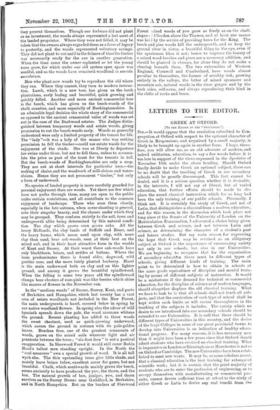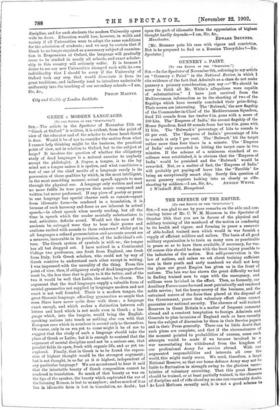LETTERS TO THE EDITOR.
GREEK AT OXFORD.
[To THE EDITOR OP THE " SPECTATOR." J SIR,—It would appear that the resolution submitted to Con- gregation at Oxford with respect to the optional character of Greek in Responsions, and negatived by a small majority, is likely to be brought up again in another form. I hope, there- fore, you will allow me, as an old advocate of modern, and indeed utilitarian, education, to say a few words before it is too late in support of the views expressed in the Spectator of November 15th under the above heading. Should Oxford finally decide to make Greek an optional subject, there can be no doubt that the . teaching of Greek in our secondary schools will be greatly discouraged. This fact cannot be denied, and it is a serious question whether it is desirable, in the interests, I will not say of liberal, but of varied education, that further efforts should be made to dis- place the sound classical instruction which for so long had been the only training of our public schools. Personally, I think not. It is certainly the study of Greek, and not of Latin, that distinguishes a classical from a modern education ; and for this reason, in the discussion which took place not long since at the Senate of the University of London on the Matriculation Examination, I advocated a choice being given between Greek and science, and not between Latin and science, as determining the character of a student's past and future studies. But my main reason for expressing the hope that Greek may be retained as an obligatory subject at Oxford is the importance of encouraging variety not only in our schools, but also in our Universities. We are beginning to recognise that for the organisation of secondary educaRvn there must be different types of schools, giving different kinds of training. The main point to be determined is how to obtain in schools of the same grade equivalence of discipline and mental train- ing by means of different subjects of instruction. It would be a misfortune if the demand for technical or commercial education, for the discipline of science or of modern languages, should altogether displace the old classical training. What we have to look to is that all schools shall not teach all sub- jects, and that the curriculum of each type of school shall be kept within such limits as will secure thoroughness in the teaching of the subjects it includes. The variety which we desire to see introduced into our secondary schools should be extended to our Universities. It is well that there should be different types of Universities in this country, and the desire of the large Colleges in some of our great provincial towns to develop into Universities is an indication of healthy educa- tional progress. For many reasons, it is less necessary now than it might have been a few years since that Oxford should admit students who have received no classical training. What is imperative on London or Birmingham or Manchester is not so on Oxford or Cambridge. The new Universities have been estab- lished to meet new wants. It may be, as some scholars assert, that a classical education is the best training for subsequent scientific work; but it is certain that the great majority of students who are to enter the profession of engineering, or to occupy themselves with manufacturing or commercial pur- suits, cannot devote sufficient time at school to the study of either Greek or Latin to derive any real benefit from the
discipline, and for such students the modern University opens wide its doors. Education would lose, however, in width and variety if all Universities were to adopt the same conditions for the admission of students ; and we may be certain that if Greek be no longer required as a necessary subject of examina- tion in Responsions at Oxford, the language will gradually, cease to be studied in nearly all schools, and exact scholar- ship in this country will seriously suffer. It is because I desire to see our new Universities stamped each with its own individuality that I should be sorry if the University of Oxford took any step that would dissociate it from its great traditions, and indirectly tend to introduce undesirable uniformity into the teaching of our• secondary scbools.—I am, Sir, &e., City and Guilds of London Institute.
PHILIP MAGNUS.











































 Previous page
Previous page